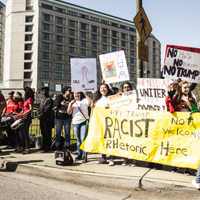Cleveland Convention Protest Restrictions Are Challenged
 Protesters at the California Republican Convention in April. Credit: Ramin Talaie / Getty Images
Protesters at the California Republican Convention in April. Credit: Ramin Talaie / Getty Images
Colin Moynihan, © 2016 New York Times News Service
The American Civil Liberties Union of Ohio sued the city of Cleveland on Tuesday, saying that it was violating protesters’ free speech rights with undue restrictions on demonstrations during next month’s Republican National Convention.
At issue are a set of special rules that the city adopted on May 25 that are meant to be in effect during the convention, which runs from July 18-21, and cover an area of about 3 square miles in downtown Cleveland, referred to by the city as an “event zone.”
The lawsuit challenges a number of the restrictions, including limits on street marches to 50 minutes per group and to a single approved route over a bridge, and on three of the four convention days to the hours of 9 a.m. to 2 p.m., hours before the major convention activities. The suit also contests the city’s refusal to issue any park-use permits for the event zone, except for art and public installations in two small parks.
“Severe limits imposed by the city on the rights of the people to freely assemble and to express their political and other views are arbitrary, unduly restrictive, and without rational justification,” lawyers for the ACLU wrote in a complaint filed in U.S. District Court in Cleveland on behalf of a pro-Donald Trump group, an anti-poverty group and a homeless advocacy group. The lawsuit said Cleveland was also “further trampling First Amendment rights by delaying the processing of applications for permits required to engage in First Amendment activities during the convention.”
Dan Williams, a spokesman for the city, declined to comment. ... In a letter last week, the city’s chief counsel, Gary Singletary, responded to some concerns ACLU lawyers had raised during a previous meeting, saying the city was not “unreasonably limiting free speech within the event zone.” Though the city is limiting the number of street marching permits to 18, he noted that “absolutely no permit is required for a sidewalk parade that does not obstruct vehicular or pedestrian traffic.”
Past attempts by cities to balance security and free expression have led to legal battles before and after national conventions.
Republican conventions in 2000, 2004 and 2008 were accompanied by mass arrests, occasional street skirmishes between the police and protesters, instances of property damage and millions of dollars in payouts to people who said their civil rights were violated by wrongful arrests.
With the expected nomination in Cleveland of Trump, whose campaign appearances have drawn demonstrators and sometimes included violence by both supporters and detractors, preparations in Cleveland have drawn close scrutiny. A Cleveland official said that the city had solicited bids to provide items like protective gear for the police, batons and “tactical hard-knuckle gloves.”
Beginning in February, representatives of groups with various political leanings began asking the city for permits to rally or march. City officials did not respond publicly to those requests, sometimes declining to tell reporters in Ohio how many permit applications they had received, and saying that they would make permit decisions about two weeks before the convention.
To Learn More:
Supreme Court Calls Protest Buffer Zone Unconstitutional…Except in Front of the Supreme Court (by Steve Straehley, AllGov)
Houston FBI Justified Spying on Protesters by Saying Keystone Pipeline was Vital to National Security (by Noel Brinkerhoff, AllGov)
Oakland and Alameda County Owe Protesters $1 Million for Abusive Mass Arrest (by Ken Broder, AllGov California)
- Top Stories
- Unusual News
- Where is the Money Going?
- Controversies
- U.S. and the World
- Appointments and Resignations
- Latest News
- Trump to Stop Deportations If…
- Trump Denounces World Series
- What If China Invaded the United States?
- Donald Trump Has a Mental Health Problem and It Has a Name
- Trump Goes on Renaming Frenzy






Comments